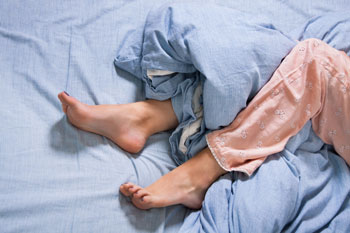Aching legs can often be attributed to vigorous physical exertion like running or standing for prolonged periods. However, when you experience pain in the legs when you're resting like sitting or sleeping, this is very bewildering. If the pain cannot be attributed to your physical exertion, then it can be due some health condition. Surprisingly, the pain is more common than you'd think.

Causes and Treatments of Aching Legs When Lying Down
The predominant cause of painful lower extremities are circulatory and neural conditions. The lower legs are usually involved, like the calves and feet. Conditions that may cause symptoms of leg pain while at rest are:
1. Distended Leg Veins
Blood moving from the feet back to the heart has the longest distance to travel and also has to travel against gravity. Blood flow is directed in the correct direction by valves that are present in the blood vessels, together with the muscles of the lower limbs. Over time and under certain conditions, the blood vessel wall weakens and swells, and the valves become incompetent. The condition that ensues is known as varicose veins. They are visible under the surface of the skin as an entangled mass, almost resembling a mangled spider's web. This mass can be painful especially when the blood is allowed to pool over a period. Pooling can occur when the person is stationary, like when lying down.
What to Do
- Physical movement like walking or putting the feet up will minimize the blood pooling and improve the circulation.
- Massage
- Surgical intervention
2. Narrow Leg Arteries
A good blood supply is essential to deliver sufficient oxygen and nutrients to all the structures in the body. Some of the structures in the legs that may suffer with an insufficient blood supply are the bones, skin, muscles, ligaments and the joints. A medical condition called peripheral artery disease may cause the arteries of the leg to constrict. This can be due to a build-up of fatty deposits that narrow the blood vessels. Reduced blood supply to the various tissues in the legs can cause a blood clot to form and eventually, a part of the affected tissue may die off. This medical condition causes aching legs when lying down.
What to Do
- Medical treatment is required to improve blood circulation and prevent any tissue damage due to insufficient blood supply. Consult your doctor about the available medical treatments.
- Some people feel some relief if they lie down with their feet hanging over the side of the bed. Gravity assists in improving the blood supply to the lower extremities.
- Drinking plenty of water to improve hydration levels.
- Take over-the-counter pain relief.
- Improve muscle relaxation by applying hot and cold compresses.
3. Blood Clot in the Lower Extremity
The medical condition called Deep Vein Thrombosis (DVT) occurs when a blood clot develops in one of the veins of the leg. This can occur if there is a sluggish blood flow in the legs for some reason, like a long-haul flight or being bed-ridden for some time where the person has long periods of inactivity. The clot that forms can block normal blood flow, resulting in tissue damage due to insufficient oxygen and nutrients to the affected area. However, the bigger threat of a blood clot is that it can dislodge and travel towards the heart and lungs. An occlusion to one of these important organs can be fatal. The leg pain associated with DVT can be cramp-like in nature and may occur both at rest and during activity.
What to Do
- Medical treatment should be urgently sought to prevent any serious consequences.
- During long flights, keep moving your limbs to improve blood circulation and to prevent blood clots.
4. Neural Conditions
Neural conditions can affect the nerves in the legs, causing aching legs when lying down. These conditions include some vitamin deficiencies, physical injuries or infections that directly infect the nerves. The leg pain can also be due to referred pain, like in the case of sciatica. This condition is due to an inflamed sciatic nerve.
What to Do
- Do exercise to improve circulation.
- Improve posture by a chiropractor.
5. Diabetic Foot
In patients with advanced diabetes, leg pain is a common symptom. There may be a two-fold cause of leg pain: blood supply to the leg is reduced and there is nerve damage to the foot or leg. Also in these patients, any injuries are not recognized early enough due to the neural damage. In diabetic patients, there is a marked decrease in wound healing and secondary infections are common.
What to Do
If you are a diabetic, ensure you take good care of your feet and legs. Inspect them for new wounds or blisters regularly and have these treated by a podiatrist or other health professional.
6. Growing Pains
Children between the ages of 3 and 12 often experience unexplained pain in the legs. It tends to occur at night while the child is at rest. There is, however, no scientific evidence linking any growth spurts to leg pain. It is believed that children in this age group tend to be very physically active and the pain is due to exertion.
What to Do
- Massage the muscles gently to relive any pain.
- Reassure and calm the child.
7. Menopause
It is believed that hormonal changes and certain vitamin deficiencies in menopause can cause aching legs when lying down in women. The exact cause is not determined, so do consult your doctor to rule out other possible causes.
What to Do
- Ensure you exercise to maintain good blood circulation.
- Ascertain if you have any vitamin deficiencies and correct these with supplements or a change in diet. Eat healthy foods and avoid any processed foods.
- Control your weight if you are overweight. This can help you regulate the hormones.
